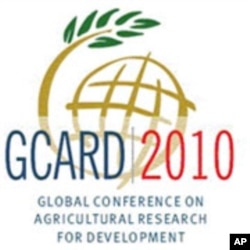The Global Conference on Agricultural Research for Development (GCARD) continued for a third day Tuesday in Montpellier, France.
About one thousand participants are trying to produce an action plan for G8 and G20 countries to boost agriculture and help ensure food security. Peter Hartmann, director-general of the Nigerian-based International Institute of Tropical Agriculture, is among those taking part.
“My hope is that regions of Africa, Americas and Asia would present clearly what their needs are and where they see science could contribute,” he says.
Much to offer
“We could contribute a lot because we can boost productivity and we can reduce the waste from plant pests, diseases and just waste from post harvest losses.”
There’s been much debate in recent years over genetically modified seeds and plants. Those promoting biotechnology say it can help solve food insecurity, while critics say it can threaten biodiversity.
“My view is that it’s a subject that’s very poorly understood says Hartmann. First of all, it’s not one technology. It’s biotechnologies. It’s a collection of technologies. And the second point I would say is that too many people put it on a pedestal as though it’s the savior of everything.”
Nevertheless, he says, the technologies have value.
“It’s a healthy group of scientific tools that we can use to speed up the things I said we could do to speed up food and agriculture.”
Faster growing plants
The International Institute of tropical Agriculture was established in 1967 with the financial support of the Rockefeller and Ford Foundations to operate in sub-Saharan Africa. It has programs in about 15 countries.
“So we are very focused. That’s the only place you’ll find our people,” he says.
Part of the institute’s mission is to fight biological threats to key food crops.
Hartmann adds, “We have been providing varieties (of plants) that farmers can use to their advantage.” For example, the traditional variety of black eyed peas takes 120 days before they can be harvested.
“We provided varieties that can grow in 35 days or 65 days. So when the weather changes or the rains are inconsistent, they are helped a lot by using crops that can grow quickly,” he says.
Getting back to the land
Hartmann says he wants to raise awareness about agriculture’s contribution to economic growth, poverty reduction and food security.
“Countries like Nigeria, for example, that had oil, forgot about agriculture. And now they’re realizing that was a mistake and they’re coming back to it, same as Gabon. And when that kind of awareness arrives then we can move much faster because there’ll be support for national systems and universities and investors to look at that sector.”
The Global Conference on Agricultural Research for Development continues through March 31st.




